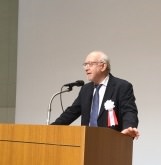"What can we, high school students, do for the ageing world?" Kobe/Hyogo High School Forum: Youth Meeting the World
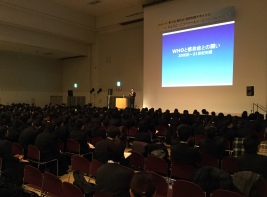
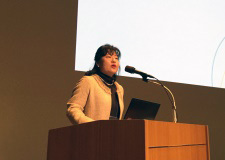
In the keynote speeches, Professor Junko Otani of Graduate School of Human Sciences, Osaka University talked about her experiences working in several international agencies in many different parts of the world, and her field work in disaster-struck areas such as the Great Hanshin Awaji Earthquake, the Great East Japan Earthquake to the Great Sichuan earthquake in 2008. As a message to the students, she emphasized the importance of studying foreign languages. “Not only English but some of the Asian languages will be a great asset; don't be introvert, be an extrovert.”
And Dr Ryoma Kayano, Technical Officer of the WHO Kobe Centre took the podium and explained about WHO and its history of fighting against communicable diseases and public health concerns in the 21st century, such as emerging communicable diseases, global population ageing and the double burden of communicable and non-communicable diseases. He also mentioned that “Challenge your limits and widen your horizon when you are young. A bright future is yours.”
Mr Shinjiro Nozaki, External Relations Officer of the WHO Kobe Centre then moderated a Panel Discussion with four high school students, under the theme of “Japan’s future, the ageing society”. Ms Miori Oshima of Hyogo Prefectural Amagasaki-Inazono High School mentioned “The definition of old people in Japan, 65 years old, should be changed and raised now reflecting healthy and active old age”. Mr Keisuke Kanda of Hyogo Prefectural Sumoto High School shared his idea of “Creating a new compact city in an open area in Awaji island with a public transportation network and facilities needed in everyday life, in order to produce more chances of communication and jobs for the older population.”
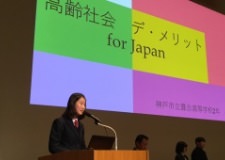
Ms Mai Tamura of Hyogo Prefectural Tatsuno Senior High School said “Japan should increase the chances of social connections and social participation among older persons and to be a role model to the world showing healthy and active ageing”. Ms Hana Kobayashi of Kobe Municipal Fukiai High School said “Old people contribute to society significantly economically and socially. Their experiences are important to the economy, they can take care of grandchildren whose parents are working, they play an important role in inheritance of tradition and safety and security in the community.”
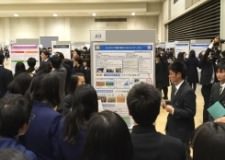
In the afternoon, lively discussions and presentations took place at the 30 booth exhibitions; at podiums where 13 short lectures on activities by globally active organizations, entities, and universities were delivered; and at 84 poster sessions where students presented their work.
To wrap up the day’s extensive programme, Dr Hisanobu Kakizawa, Associate Professor at Center for Education in Liberal Arts and Sciences of Osaka University, mentioned “There are multiple viable solutions for given questions, and you cannot find one correct answer in the textbook. Trial and error learning method is important.” He encouraged the students to pursue excellence in their future work and careers, and noting they will be the ones to discover new solutions.
